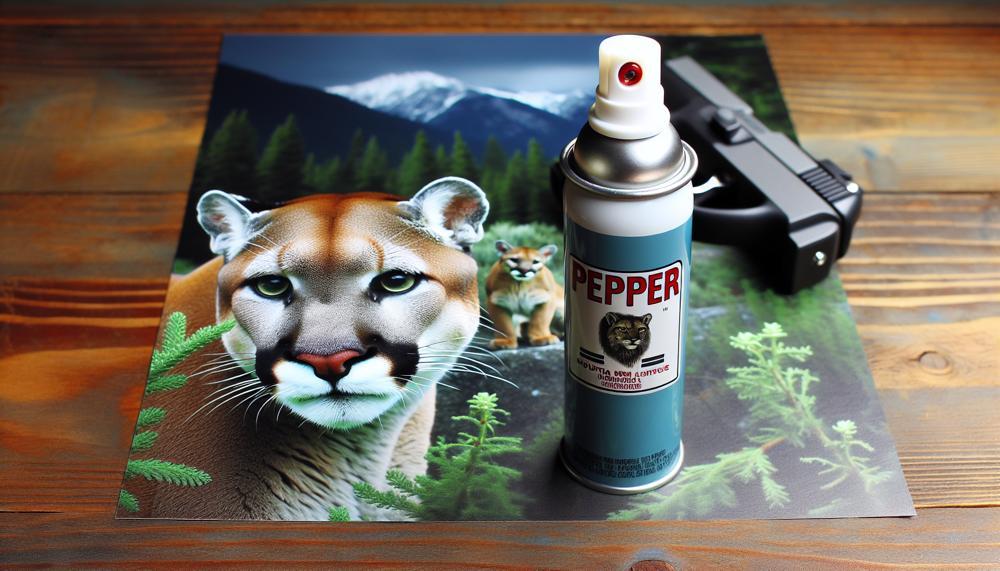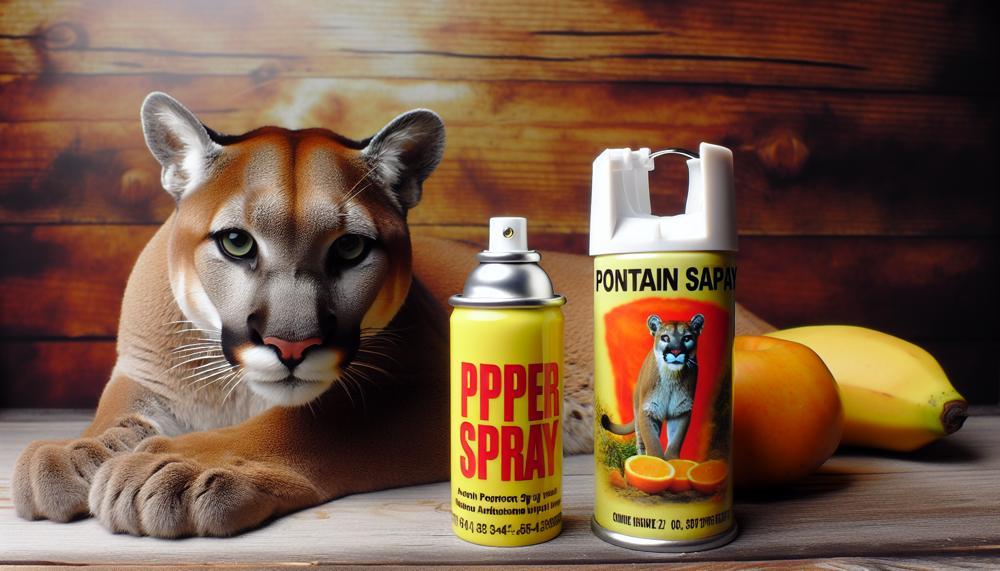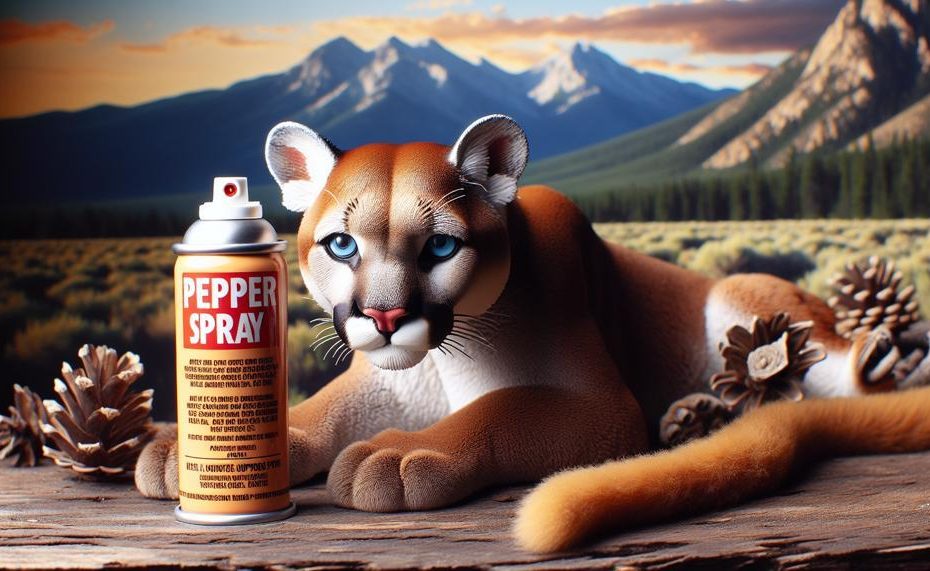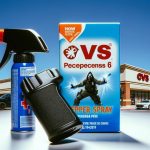Do you find solace in exploring the untamed wilderness, surrounded by the beauty of nature? Do you call a place home where mountain lions prowl freely?
If this resonates with you, then perhaps you’ve considered adding pepper spray to your hiking essentials as a means of protection against these majestic yet formidable predators.
But does this fiery deterrent truly stand a chance against the sheer strength and ferocity of a mountain lion? Let’s delve deeper into this question and see what experts have to say.
- Mountain lions, also known as cougars or pumas, roam various parts of North America.
- While human attacks are rare, encounters with these creatures can be alarming and potentially perilous.
- Pepper spray is a non-lethal self-defense tool that has been trusted by hikers, campers, and outdoor enthusiasts for decades.
- But how effective is it against an animal as large and aggressive as a mountain lion?
- According to wildlife specialists, pepper spray can indeed be an efficient means of deterring a mountain lion attack.
- The potent scent and burning sensation caused by its active ingredient, capsaicin, can disorient and discourage the animal from pursuing its attack.
So before embarking on your next expedition in mountain lion territory, ensure to pack some pepper spray for added peace of mind.
However, always remember to follow proper safety measures and educate yourself on its proper usage.
Stay safe out there.
Contents
- 1 Where Do Mountain Lions Live?
- 2 Does Pepper Spray Work on Mountain Lions?
- 3 Why Are Mountain Lions Dangerous?
- 4 How Often Do Mountain Lions Attack Humans?
- 5 How to Avoid a Mountain Lion Attack
- 6 Does Bear Spray Work on Mountain Lions?
- 7 Factors That Affects the effectiveness Of Bear Spray
- 8 How to Fend Off a Mountain Lion Attack
- 9 Conclusion
Where Do Mountain Lions Live?
Mountain lions, also known as cougars, panthers, pumas and America’s Lion, are versatile predators with a broad range across North and South America.
They can be found in a diverse array of environments such as rocky canyons, deserts, tropical forests, wetlands, and mountains.
These formidable creatures utilize various shelters for protection, and females have designated dens for raising their cubs.

| Region | Habitat | Shelter |
| North America | Rocky canyons, deserts, grasslands, wetlands, and forests | Caves, dense vegetation, rocky crevices |
| South America | Tropical forests and mountains | Dense vegetation and caves |
| Central America | Wetlands and forests | Dense vegetation and caves |
| Andes Mountains | Mountainous regions with rugged terrain | Caves and rocky crevices |
| Pantanal Region (South America) | Flooded grasslands with patches of forest | Dense vegetation and caves |
| Pampa Region (South America) | Grasslands with scattered trees and shrubs | Sparse vegetation or rocky outcroppings |
| Amazon Rainforest (South America) | Tropical rainforest with diverse habitats and ecosystems | Dense vegetation and caves |
The adaptability of mountain lions allows them to thrive in a variety of biomes and habitats, making them one of the most widespread mammals in the western hemisphere. However, their populations have been declining due to human activity, including habitat loss, fragmentation, and poaching.
In areas with a high deer population, there is also a likelihood of mountain lions present as deer are their natural prey. It is important to take precautions when entering mountain lion territory, such as avoiding hiking or camping alone and making loud noises to alert any nearby animals.
Does Pepper Spray Work on Mountain Lions?
In fact, pepper spray can work well to scare away mountain lions. For pepper spray to work, you have to aim straight for the face with its stream-like projectile. When used correctly, pepper spray can make someone temporarily uncomfortable and confused, giving them a chance to get away.
You can also call mountain lions cougars, pumas, or panthers. They have very sensitive noses and don’t like it when you hurt them. If you give them pepper spray, they’ll react quickly, which means they’ll almost always run away quickly.
But it takes careful thought and training to use pepper spray as a defense against big animals.
These are some other ways to protect yourself from a mountain lion:
- Wave your arms slowly
- Speak firmly in a loud voice
- If making yourself look bigger doesn’t scare the mountain lion away, throw rocks, twigs, or anything else you can reach at it without bending over or turning your back.
- Wave sticks, wave your pack, whatever you can do to look scary
- Don’t antagonize it
Why Are Mountain Lions Dangerous?
The potential hazards of coming across a mountain lion include being attacked and potentially killed, especially if the cougar perceives humans as a threat to its cubs. It’s essential to know how to react if you encounter a mountain lion to ensure your safety and make informed decisions while exploring areas inhabited by wildlife.
Mountain lions are dangerous predators with sharp teeth and claws, capable of killing humans and other animals. While attacks on humans are rare, there have been cases of cougars attacking and killing people.
These wild cats are generally shy and tend to avoid human contact, but they may become aggressive if they feel threatened or if their territory is invaded. This is why it’s crucial to be aware of the potential risks and take precautions while exploring areas where mountain lions may reside.
One possible means of self-defense against mountain lions is pepper spray. Though not specifically designed for use against cougars, bear spray can be an effective form of self-defense as it works on both bears and cougars. Pepper spray is a chemical derived from a chili plant that can cause serious pain and temporary blindness when sprayed on someone’s face.
The effects include closing the eyes, coughing, and tearing up, creating a strong deterrent effect on mountain lions and giving you time to safely retreat from the area.
How Often Do Mountain Lions Attack Humans?
Mountain lion attacks on humans are not common, but they do happen. According to data from the North American Mountain Lion Foundation, there have been 125 recorded instances of mountain lion attacks on humans in the United States and Canada since 1890, resulting in 27 fatalities. This means that on average, only one person is attacked by a mountain lion each year in North America.
However, it is essential to note that these statistics may not accurately represent the true occurrence of attacks. Many attacks likely go unreported or are misidentified as other causes of death. Additionally, as mentioned in the previous section, factors such as human encroachment and climate change may be contributing to an increase in mountain lion attacks.
The presence of attacks highlights the importance of being prepared for a potential encounter with a mountain lion. Carrying pepper spray can be an effective self-defense tactic against a mountain lion attack.
According to a study published in the Journal of Wildlife Management, pepper spray has been proven to deter attacks by wild animals, including mountain lions.
Pepper spray is a chemical derived from chili peppers that causes temporary discomfort and pain when sprayed onto someone’s face. It can cause a mountain lion to retreat, giving a person time to escape or seek help.
However, it is crucial to note that pepper spray may not always be effective and should only be used as a last resort in an attack.
While mountain lion attacks on humans are infrequent, being prepared and taking precautions can significantly reduce the risk of an attack.
How to Avoid a Mountain Lion Attack
When venturing into mountain lion territory, it’s important to take precautionary measures to avoid any potential encounters. These steps can greatly decrease the likelihood of an attack and ensure your safety while in their habitat.
Let’s explore some practical tips on how to avoid a mountain lion attack.

| Step 1: Be Mindful of Your Surroundings | First and foremost, it’s crucial to note that the chances of encountering a mountain lion are extremely rare, similar to being bitten by a shark or struck by lightning. Despite this, it’s always wise to use common sense when hiking or camping in their territory. | It’s essential to remain alert at all times and be mindful of your surroundings to avoid any unexpected encounters. |
| Step 2: Make Some Noise | Mountain lions typically steer clear of humans, so make your presence known by talking loudly or singing while hiking. | If you do happen to spot a mountain lion, make noise and try to appear larger and more intimidating. Hiking with a partner can also enhance this effect and make you seem more formidable. |
| Step 3: Stay Calm | If you do encounter a mountain lion, it’s essential to remain calm. Avoid panicking or running away, as these actions may provoke the animal. | Do not turn your back on the mountain lion or make any sudden movements. Instead, maintain eye contact and slowly back away while facing the animal. |
| Step 4: Steer Clear of Dead Animals | Avoid areas with dead animals as they can attract mountain lions looking for an easy meal. | Be cautious when approaching carcasses of any kind and always scan the area for any signs of predators. |
| Step 5: Consider Self-Defense Tools | There are several self-defense tools available, such as pepper spray, that can work against mountain lions due to their heightened sense of smell. | Bear spray or firearms can also be effective in fending off a mountain lion attack, but it’s vital to be trained and familiar with these tools before relying on them for defense. |
| Step 6: Fight Back if Necessary | In the rare case of being attacked by a mountain lion, it’s best to put up a fight rather than playing dead or attempting to escape. | Use any available tools or weapons to defend yourself with all your strength, as this may cause the mountain lion to release its prey and retreat. |
Does Bear Spray Work on Mountain Lions?
Mountain lions are powerful and unpredictable predators that can pose a threat to hikers and campers in their territory. As such, many people wonder if bear spray is an effective tool in deterring mountain lion attacks.
The answer is yes, bear spray has been proven to be effective against mountain lions.
Factors That Affects the effectiveness Of Bear Spray
There are important factors that must be considered in order to ensure its effectiveness.
First and foremost, the range of the bear spray is crucial. A longer range means the spray can reach farther and you can maintain a safe distance from the animal while still being able to use it effectively. It is recommended to have a bear spray with a range of at least 30 feet.
The concentration of capsaicin in the bear spray is also important. Capsaicin is the active ingredient that causes irritation and pain. A higher concentration means more capsaicin, making the spray more effective in deterring a mountain lion attack.
Size and portability are also crucial factors to consider when choosing a bear spray. You want to make sure that you can easily carry it with you while hiking or camping. A small, compact canister that can easily fit in a pocket or attach to your belt is ideal for convenience and accessibility.
However, even with all of these factors taken into consideration, bear spray is not a guaranteed solution for deterring mountain lion attacks. Mountain lions are wild animals and their behavior can be unpredictable. It is possible for them to still attack even after being sprayed with bear spray.
Bear spray should only be used as a last resort in self-defense against mountain lions. It is not meant to be used as a deterrent or repellent for animals in general. The capsaicin in bear spray causes temporary pain, irritation, and even temporary blindness, making it an effective tool for self-defense against mountain lions.
How to Fend Off a Mountain Lion Attack
When facing the possibility of a mountain lion attack, pepper spray can be an effective tool for self-defense. But before using it, there are important factors to consider to ensure its effectiveness and safety. Here’s how to use pepper spray for self-defense against mountain lions:
- Choose a high-quality, strong pepper spray: It’s crucial to select a product specifically designed for defense against large animals when purchasing pepper spray. Look for sprays with high concentrations of capsaicin, the active ingredient in pepper spray, and a long spray range.
- Familiarize yourself with the instructions: Before venturing into mountain lion territory, make sure to read and understand the instructions for using pepper spray. Practice removing the safety lock and aiming the canister to increase your confidence in utilizing it effectively.
- Keep the pepper spray within reach: In case of an encounter with a mountain lion, it’s important to have quick access to your pepper spray. Keep it in a holster on your belt or in a pocket that is easily reachable.
- Use it as a deterrent: Pepper spray can serve as a deterrent by spraying it in front of you or towards the mountain lion if it approaches you. The strong scent and irritant properties may cause the mountain lion to retreat.
- Aim for the eyes and nose: If the mountain lion continues to approach or attack, aim the pepper spray directly at its eyes and nose. These are sensitive areas that can cause temporary blindness and pain, potentially giving you time to escape.
- Use it as a last resort: If all else fails and the mountain lion continues to attack, use the pepper spray as a last resort by spraying it directly into its face. This may cause enough pain and discomfort for you to make your escape safely.
| Pepper Spray Tips: | Do’s: | Don’ts: |
| Practice using pepper spray before venturing into mountain lion territory. | Do keep the pepper spray within reach. | Don’t use expired or damaged pepper spray. |
| Make sure to read and understand the instructions for using pepper spray. | Do aim for the eyes and nose of the mountain lion. | Don’t rely solely on pepper spray for self-defense. |
| Choose a high-quality, strong pepper spray designed for defense against large animals. | Do use pepper spray as a deterrent by spraying it in front of you or towards the mountain lion. | Don’t use pepper spray on someone else without their consent. |
Conclusion
In conclusion, while mountain lion attacks on humans are rare, it is crucial to be prepared and take necessary precautions when venturing into their territory.
Pepper spray can serve as a powerful tool for self-defense against these predators, but it should be used in conjunction with other safety measures. It’s important to select a high-quality pepper spray, familiarize yourself with its proper usage, and keep it easily accessible at all times.
When confronted by a mountain lion, use the pepper spray as a deterrent by spraying it in front of you or towards the animal, aiming for its eyes and nose if necessary. However, always keep in mind that pepper spray should only be used as a last resort and should not be solely relied upon for protection.
Stay vigilant and well-informed on how to avoid encounters with mountain lions while appreciating the raw beauty of nature’s untamed wilderness.





